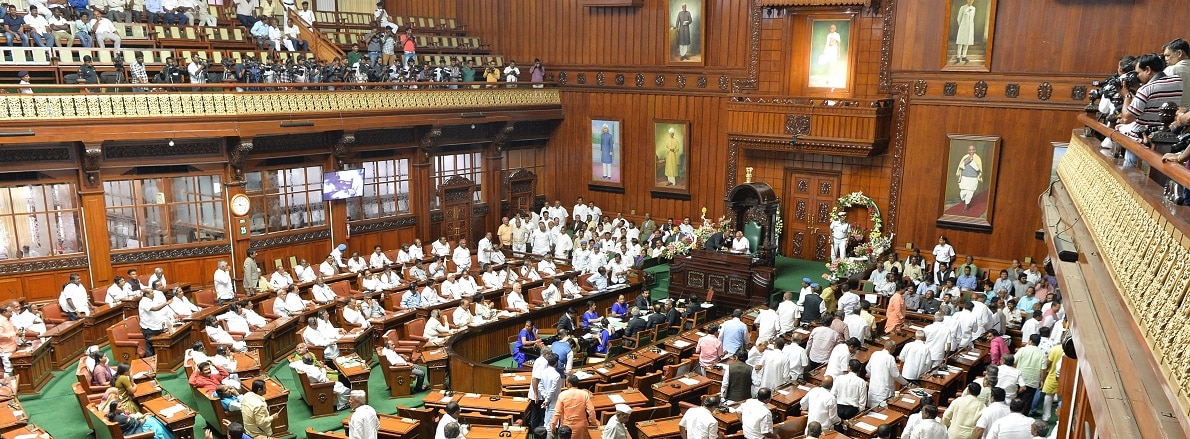The Karnataka election results once again perpetuate a disturbing trend regarding the decline of Muslim representation in various Assemblies where the Bharatiya Janata Party (BJP) has emerged a dominant force. The number of MLAs is just seven in a State where Muslims make up 12.91% of the population. The decline from 2013 is mainly owing to the BJP’s continued strategy of not fielding Muslim candidates, although it has emerged as the single largest party with 104 members.
One story, three States
Though the BJP has a few symbolic Muslim faces in New Delhi, its decision not to field Muslim candidates in Uttar Pradesh in 2014 and 2017, and in Gujarat in 2017, and now in Karnataka only confirms that this exclusion is indeed a carefully crafted campaign strategy. In December 2017, in Gujarat, the Vijay Rupani-led BJP government was sworn in with no Muslims in its ranks. U.P.’s BJP government has the same story, and it will be so in Karnataka too if the BJP manages to form the government.
When India’s largest political party pursues such a strategy and finds it electorally rewarding, it may be emulated by other political parties. What does this exclusion from legislatures imply for the Indian polity or for Muslims? One implication is that Muslims will not be part of the political elites and consequently command their own political voice. Such a vision of denial has been ingrained in the Hindutva narrative and in the writings of its founding fathers. Indeed, it is a necessary process for any majoritarian polity that hopes to force minorities to live according to its terms.
These exclusionary possibilities of a majoritarian polity were foreseen by minority leaders during the Partition debate. In the Constituent Assembly, there was demand for communal electorates and reserved seats like those for the Scheduled Castes and Scheduled Tribes. Sardar Patel, as the chairman of the advisory committee on minorities, took the initiative to abolish communal electorates and communal quotas in legislatures. According to Rajmohan Gandhi, Patel’s biographer, this gave him enormous satisfaction.
Representatives of minorities in the Constituent Assembly backed the idea to end separate electorates, seen as the reason for Partition. But a considerable campaign was needed to persuade them to give up the demand for reserved seats. Patel was fiercely opposed to the idea of reserved seats. A minority community, he argued, if it speaks in one voice might be able to achieve its demands, but it would lose the goodwill of the majority. Patel persuaded the minorities — Christians, Parsis, Sikhs, Anglo-Indians, and Muslims — to give up reserved seats, to earn that goodwill. Maulana Azad took time but finally conceded. Patel even won over Begum Aizaz Rasul of U.P., a former Muslim League member, to give up reservation. On May 11, 1949, the advisory committee moved a resolution that there would be no reservation except for SCs and STs — it had 58 votes in favour and three against, thus no consensus.
Christians also gave up their demand for reserved seats, because they were promised the right to propagate Christianity. But with a slew of anti-conversion laws in later years, harsh and stringent under various BJP governments, the deal with Christians regarding propagation of Christianity stands seriously compromised today.
On another occasion, two weeks later, Patel had said, “I want the consent of all minorities to change the course of history… Whatever may be the credit for having won a Muslim homeland, please do not forget what the poor Muslims have suffered. I respectfully appeal to the believers in the two-nation theory to go and enjoy the fruits of their freedom and leave us in peace.” In this age of ‘love jihad’, ‘ghar wapsi’ and cow vigilantism, we may ask: Where is Patel’s promised peace?
Since 2002, Prime Minister Narendra Modi has been criticised over the Muslim exclusion issue. He was once confronted by former Madhya Pradesh Chief Minister Digvijay Singh at a function in New Delhi in 2008 on this issue. Muslim exclusion, he argued, was not based on any communal consideration but was determined purely by winnability criteria. The idea of winnability is a subjective one, and if the notion of winnability were entirely objective, all the BJP candidates should invariably win. Clearly, this argument of winnability is intended to hide a deliberate policy of denying Muslims an opportunity to compete for a place in India’s political power structure.
Empowerment
Diversity of representation is a natural working principle for a diverse society to articulate the varied interests of different communities — and expand the idea of political justice and empowerment. In an ideal secular polity, non-Muslims could represent Muslim interests, and vice versa, as some would argue. Since that ideal polity is utopian, self-representation becomes necessary as part of diversity of representation to further the cause of democracy. To have a blanket policy not to let a minority community from being part of its highest political structure is a sinister design. For Muslims, this exclusion would depoliticise the community and create political conditions in which the majority would dictate terms, and force Muslims to live at its mercy. It would further perpetuate the idea of Muslim backwardness as naturally ordained in a polarised polity, the way it was argued for India’s Dalits for centuries.
Article published on The Hindu on May 19, 2018
Credit: Manjunath Kiran / AFP


